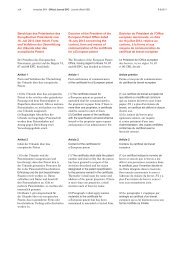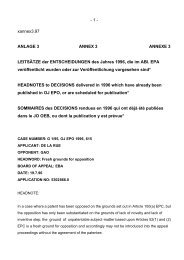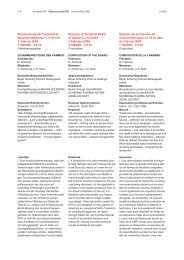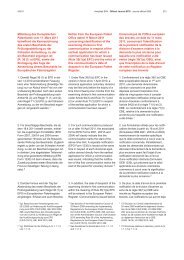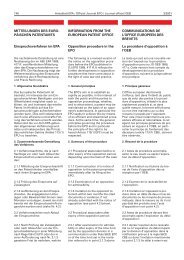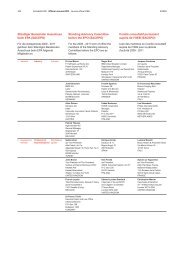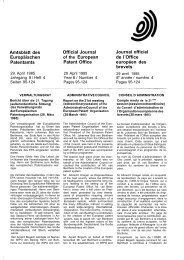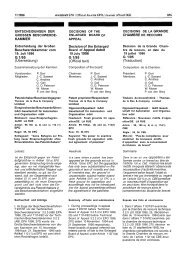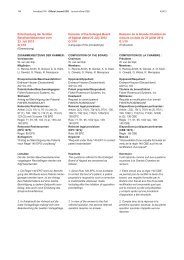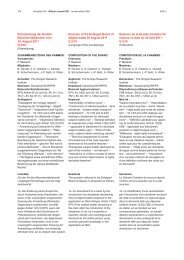Sonderausgabe 1 - European Patent Office
Sonderausgabe 1 - European Patent Office
Sonderausgabe 1 - European Patent Office
You also want an ePaper? Increase the reach of your titles
YUMPU automatically turns print PDFs into web optimized ePapers that Google loves.
2007 <strong>Sonderausgabe</strong> Nr. 1 ABl. EPA / Special edition No. 1 OJ EPO / Edition spéciale n° 1 JO OEB 85<br />
(4) Die Staaten, die die revidierte<br />
Fassung des Übereinkommens im Zeitpunkt<br />
ihres Inkrafttretens weder ratifiziert<br />
haben noch ihr beigetreten sind, gehören<br />
von diesem Zeitpunkt dem Übereinkommen<br />
nicht mehr an.<br />
Artikel 173<br />
Streitigkeiten zwischen Vertragsstaaten<br />
(1) Jede Streitigkeit zwischen Vertragsstaaten<br />
über die Auslegung oder Anwendung<br />
dieses Übereinkommens, die nicht<br />
im Verhandlungsweg beigelegt worden<br />
ist, wird auf Ersuchen eines beteiligten<br />
Staats dem Verwaltungsrat unterbreitet,<br />
der sich bemüht, eine Einigung zwischen<br />
diesen Staaten herbeizuführen.<br />
(2)WirdeinesolcheEinigungnicht<br />
innerhalb von sechs Monaten nach dem<br />
Tag erzielt, an dem der Verwaltungsrat<br />
mit der Streitigkeit befasst worden ist, so<br />
kann jeder beteiligte Staat die Streitigkeit<br />
dem Internationalen Gerichtshof zum<br />
Erlass einer bindenden Entscheidung<br />
unterbreiten.<br />
Artikel 174<br />
Kündigung<br />
Jeder Vertragsstaat kann dieses Übereinkommen<br />
jederzeit kündigen. Die<br />
Kündigung wird der Regierung der<br />
Bundesrepublik Deutschland notifiziert.<br />
Sie wird ein Jahr nach dem Tag dieser<br />
Notifikation wirksam.<br />
Artikel 175<br />
Aufrechterhaltung wohlerworbener<br />
Rechte<br />
(1) Hört ein Staat nach Artikel 172<br />
Absatz 4 oder Artikel 174 auf, Vertragspartei<br />
dieses Übereinkommens zu sein,<br />
so berührt dies nicht die nach diesem<br />
Übereinkommen bereits erworbenen<br />
Rechte.<br />
(2) Die europäischen <strong>Patent</strong>anmeldungen,<br />
die zu dem Zeitpunkt anhängig<br />
sind, zu dem ein benannter Staat<br />
aufhört, Vertragspartei dieses Übereinkommens<br />
zu sein, werden in Bezug auf<br />
diesen Staat vom Europäischen<br />
<strong>Patent</strong>amt so weiterbehandelt, als ob<br />
das Übereinkommen in der nach diesem<br />
Zeitpunkt geltenden Fassung auf diesen<br />
Staat anzuwenden wäre.<br />
(3) Absatz 2 ist auf europäische <strong>Patent</strong>e<br />
anzuwenden, für die zu dem in Absatz 2<br />
genannten Zeitpunkt ein Einspruchsverfahren<br />
anhängig oder die Einspruchsfrist<br />
noch nicht abgelaufen ist.<br />
(4) Such States as have not ratified or<br />
acceded to the revised text of the<br />
Convention at the time of its entry into<br />
force shall cease to be parties to this<br />
Convention as from that time.<br />
Article 173<br />
Disputes between Contracting States<br />
(1) Any dispute between Contracting<br />
States concerning the interpretation or<br />
application of the present Convention<br />
which is not settled by negotiation shall<br />
be submitted, at the request of one of<br />
the States concerned, to the Administrative<br />
Council, which shall endeavour to<br />
bring about agreement between the<br />
States concerned.<br />
(2) If such agreement is not reached<br />
within six months from the date when<br />
the dispute was referred to the Administrative<br />
Council, any one of the States<br />
concerned may submit the dispute to the<br />
International Court of Justice for a<br />
binding decision.<br />
Article 174<br />
Denunciation<br />
Any Contracting State may at any time<br />
denounce this Convention. Denunciation<br />
shall be notified to the Government of<br />
the Federal Republic of Germany. It shall<br />
take effect one year after the date of<br />
receipt of such notification.<br />
Article 175<br />
Preservation of acquired rights<br />
(1) In the event of a State ceasing to be<br />
party to this Convention in accordance<br />
with Article 172, paragraph 4, or Article<br />
174 rights already acquired pursuant to<br />
this Convention shall not be impaired.<br />
(2) A <strong>European</strong> patent application which<br />
is pending when a designated State<br />
ceases to be party to the Convention<br />
shall be processed by the <strong>European</strong><br />
<strong>Patent</strong> <strong>Office</strong>, as far as that State is<br />
concerned, as if the Convention in force<br />
thereafter were applicable to that State.<br />
(3) Paragraph 2 shall apply to <strong>European</strong><br />
patents in respect of which, on the date<br />
mentioned in that paragraph, an opposition<br />
is pending or the opposition period<br />
has not expired.<br />
(4) Les Etats qui, à la date d’entrée en<br />
vigueur de la convention révisée, ne l’ont<br />
pas ratifiée ou n’y ont pas adhéré,<br />
cessent d’être parties à la présente<br />
convention à compter de ladite date.<br />
Article 173<br />
Différends entre Etats contractants<br />
(1) Tout différend entre Etats contractants<br />
qui concerne l’interprétation ou<br />
l’application de la présente convention et<br />
n’a pas été réglé par voie de négociation<br />
est, sur demande de l’un des Etats en<br />
cause, soumis au Conseil d’administration<br />
qui s’emploie à faire intervenir un<br />
accord entre lesdits Etats.<br />
(2) Si un tel accord n’est pas intervenu<br />
dans un délai de six mois à compter de<br />
la date à laquelle le Conseil d’administration<br />
a été saisi du différend, l’un quelconque<br />
des Etats en cause peut porter<br />
le différend devant la Cour internationale<br />
de Justice en vue d’une décision liant<br />
les parties en cause.<br />
Article 174<br />
Dénonciation<br />
Tout Etat contractant peut à tout moment<br />
dénoncer la présente convention. La<br />
dénonciation est notifiée au gouvernement<br />
de la République fédérale d’Allemagne.<br />
Elle prend effet à l’expiration du<br />
délai d’une année à compter de la date<br />
de réception de cette notification.<br />
Article 175<br />
Réserve des droits acquis<br />
(1) Lorsqu’un Etat cesse d’être partie à<br />
la convention en vertu de l’article 172,<br />
paragraphe 4, ou de l’article 174, il n’est<br />
pas porté atteinte aux droits acquis antérieurement<br />
en vertu de la présente<br />
convention.<br />
(2) Les demandes de brevet européen<br />
en instance à la date à laquelle un Etat<br />
désigné cesse d’être partie à la convention<br />
continuent à être instruites par<br />
l’<strong>Office</strong> européen des brevets, en ce qui<br />
concerne ledit Etat, comme si la convention,<br />
telle qu’elle est en vigueur après<br />
cette date, lui était applicable.<br />
(3) Les dispositions du paragraphe 2<br />
sont applicables aux brevets européens<br />
àl’égard desquels, à la date mentionnée<br />
audit paragraphe, une opposition est en<br />
instance ou le délai d’opposition n’est<br />
pas expiré.



